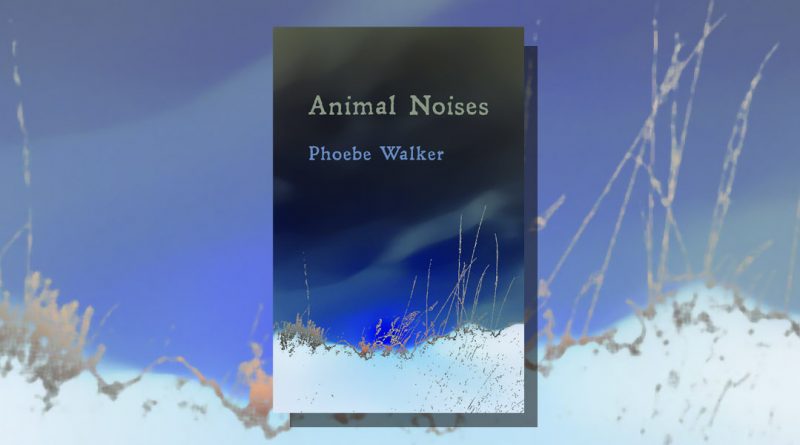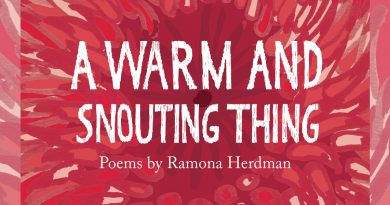Animal Noises by Phoebe Walker
-Reviewed by Karen Goodwin-
Animal Noises by Phoebe Walker is quite unlike anything I’ve read. It’s a darkly comical and sharply observed collection, reminiscent of Edward Gorey’s illustrations, giving glimpses into a Victorian macabre. Spooned up from the kitchen we have hotpot, church and salad, fat milk, jellied lamb, and wonderful titles such as ‘The Prawn Heroic’, ‘Hot Paste in a Cream Jar’, ‘Badbeef’.
The opening poem ‘Sunday, Very Early Morning’ gives us clues to the kind of animal the narrator is: “I bristle, don’t bleat. I sweat, don’t sleep through the night”. In the compound where she is adjusting to life and has “learnt to live with the heat” this blunt mantra passes for survival. There is a directness to the language which is appealing in its lack of sentiment, later in the poem a tree unceremoniously “drops her fruit with a grunt”.
Animal Noises sets out from the country idyll, the romantic ‘lie’ of the pastoral, and transports us to real and imagined places, Germany, a port in China, the backwaters of memory. She mixes formal and colloquial speech, creating dialogue and a cast of voices. We encounter characters; Charlie, Shauna, Marta, the named and unnamed bubble up through the collection and disappear.
Food is used as a sensory exploration of self which includes moments of body horror. In the curious poem ‘Charlie’ the kitchen holds the magic of reverse transubstantiation “blood turns to steam/ The poor meat tensing with its loss” something has been exhumed from the still alive cut of meat, purged and now made pure.
In a complex poem that talks of the relationship of comfort and substitution “The hurt of this year squats in my saucepan” ‘Kitchen’ is a place for endless reinvention: “Tonight I unmound a golden scalp of rice” but it comes with a cost. She invokes a brother:
you know
how this comes out.The eye in the belly of my spoon blinks.
Watch, it counsels dully,
as I lay thick coins of cheese on each plate.
The body dysmorphia is cleverly captured in the image of the spoon, which can flip concave to convex, mercurial and distorted, as each fat layer is piled with intention on the plate.
Her use of imagery is brilliantly surprising. ‘Hot Paste in a Cream Jar’ opens simply “My voice squeaks, a straining egg”. In another poem ‘Shauna’ is “functional as a blue alarm” moaning in the night, her short neck “tracks the circuit of a ceiling fan like a bound snake”.
Motherhood has no place here. In ‘Triceratops’, the narrator unfeelingly observes a child trip over a stool, spilling the contents of a box, remarking “The maternal instinct/ (never strong) congeals in my breast.” Instead she confronts the reader with an image of herself naked as a skeletal triceratops, in which she glories over “my magnificently jutting, fiendishly gleaming, exquisitely brittle bones.” These are brave poems with unsettling agendas.
There are lighter moments of the absurd and ridiculous. A cameo in ‘The Prawn Heroic’ is something straight out of Gorey’s repertoire, where the poet sends up a Professor’s writing exercise with an aside:
The prawn ghostly, translucent on the deck
the prawn tumbling, frostbitten in the wok,
the prawn heroic, of the green deep
Another poem ‘Bonbon’, reads like nonsense poetry, in the finest tradition of Edward Lear or Ivor Cutler. The sadistic voice which relishes in the act of squashing peas to pass the time until the real thing arrives. It is genuinely funny.
I’ll squash you flat, little pea,
says the deep voice
from the small, steel dish.
If I’ve to wait all these years
for bonbons,|
I may as well have my recreation.
There are moments of vulnerability too, a beautiful poem ‘Only Good Things’ allows a moment of unguardedness, watching for deer in a field as a child. “I have a milk loaf in my pocket, I have only good things to share” the deer never comes, instead the “cat is curled like an ammonite; she regards her/ weak, pink belly with contempt.”
In the title poem ‘Animal Noises’, a couple examine the ‘normal voices’ they use in public compared to their indoor voices, where:
we wheedle like baby mosquitos.
I bleat like a sheep and drop my drawers
at whim; he mewls like a stomped fox
The poem ends with a thrill, an imagined slip of register at work, where she slobbers: “in the mode/ of besotted piglet, or gloomy flounder/ Honey, what then?”
Animal Noises is a visceral and uncompromising debut by Phoebe Walker. She prises a scalpel underneath for a closer look, and the poems open up a little more each time I read. I am looking forward to her first full-length collection.






You really get to the heart of the poems and I’m so glad you liked them. Phoebe has an extraordinary, different voice.